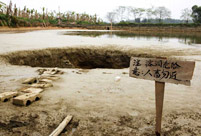

Phone scams are nothing new, and yet the people behind this faceless crime continue to swindle billions of yuan from hapless victims every year.
Boiler rooms run by scammers from Taiwan were responsible for over 50 percent of all telecom fraud in China's mainland. Nearly all major cases with reported losses in excess of 10 million yuan (1.54 million U.S. dollars) were organized by scammers from Taiwan, according to the Ministry of Public Security (MPS).
In the past seven days, 77 alleged fraud syndicate members, including 45 from Taiwan, were repatriated to China's mainland from Africa.
In interviews with Xinhua, some of the suspects from Taiwan came clean about this illicit practice.
WHO, HOW
One suspect from Taoyuan in Taiwan, identified only by his surname Jian, traveled to Kenya to join a boiler room in 2014.
According to Jian, the organization he worked for divided its members into first-, second- and third-tier groups according to their roles. All worked off pre-written scripts when talking to their "clients."
The first-tier group, a team of about a dozen people, masqueraded as managers of medical insurance accounts to acquire their victims' personal information, Jian explained.
In the calls, the victims were told that they were victims of identity theft, and their "case" would be transferred to the police after they had confirmed certain information.
Then it was time for the second-tier group, the "police officers," to take over the case. This team informed the victims that their identities had been used to facilitate money laundering, said Jian, who was one of the "police officers."
The victims were then pressed for more information, such as family background, occupation, income and bank account details. The second-tier group would then try and wheedle out how much cash the victims had in their bank accounts.
"If there was not much money, we would talk the victims into transferring their balance to us," said Jian, "however, if they were holding large deposits we would transfer the case to the third-tier group."
Another suspect, who was identified by the surname Xu, was a member of this third-tier group. His bluff was that he was the director of the financial crime department.
"We told the victims that their money must be transferred to our 'safe account' for investigation, and instructed them how to do this at an ATM," said Xu.
The fraudsters used software that changed the numbers they called from to those registered to mainland police stations.
"Any 'savvy' victim could check the number while we were on the phone," he said, "and they would be reassured."
The gang even played recordings of police stations or hospitals as background noise during the calls to further win the trust of their unsuspecting victims.
According to the police, members of the gang received a monthly salary based on their performance. The third-tier group, usually the most skilled fraudsters, earned the most, getting up to eight percent of the money earned in each deal.
Police said that the bosses and core members of many fraud rings were from Taiwan. In Jian and Xu's case, only members of the first-tier groups were from the mainland, who were usually new to the world of telecom scams.
Investigators found that during recruitment, fraud rings often favored those with criminal records.
"I am familiar with how phone scams work, so that was why the boss asked me to join," said Xu, who served a seven month sentence for fraud in Taiwan's Taichung City in 2010.
EXPORTING FRAUD
The people of Taiwan have been aware of phone scams and for this reason, around 2002, fraud rings from Taiwan began to target mainlanders.
These fraud gangs are oldhands at writing convincing scripts and devising new methods to cheat victims out of their money and information, said Zhang Jun from the criminal investigation department of the MPS. Some, he added, even create mirror websites of mainland judicial agencies to further support their back stories.
Authorities on the mainland and Taiwan worked hard to improve cooperation and stamp out telecom fraud across the Strait. However, rather than packing up and "going straight," many gangs just relocated to Southeast Asia, Africa and Oceania.
Since 2011, police from both sides have arrested more than 7,700 suspects implicated in telecom fraud gangs working in Southeast Asia, with about 4,600 of them from Taiwan.
"To hide from the police, many telecom fraud rings established themselves far from Chinese eyes, like Kenya in this case. But we are confident that we will find them, no matter where they are," said Zhang.
 The evolution of J-10 fighter
The evolution of J-10 fighter Top 10 Asian beauties in 2016
Top 10 Asian beauties in 2016 What's happening in Xisha Islands?
What's happening in Xisha Islands? When female soldiers meet flowers
When female soldiers meet flowers North Sea Fleet conducts drill in West Pacific Ocean
North Sea Fleet conducts drill in West Pacific Ocean Old photos record the change of Sichuan over a century
Old photos record the change of Sichuan over a century Breathtaking aerial photos of tulip blossoms in C China
Breathtaking aerial photos of tulip blossoms in C China Horrific: Pit swallows 25 tons of fish overnight
Horrific: Pit swallows 25 tons of fish overnight Vietnamese Su-30 fighters fly over Nanwei Island in South China Sea
Vietnamese Su-30 fighters fly over Nanwei Island in South China Sea Top 20 hottest women in the world in 2014
Top 20 hottest women in the world in 2014 Top 10 hardest languages to learn
Top 10 hardest languages to learn 10 Chinese female stars with most beautiful faces
10 Chinese female stars with most beautiful faces China’s Top 10 Unique Bridges, Highways and Roads
China’s Top 10 Unique Bridges, Highways and Roads Student lottery strands young Chinese in US
Student lottery strands young Chinese in US Gay marriage ruling marks progress in societal openness
Gay marriage ruling marks progress in societal openness China watchdog cracks down on illegal live streaming platforms
China watchdog cracks down on illegal live streaming platforms North Korean restaurants face rocky future in China as sanctions bite, staff defect
North Korean restaurants face rocky future in China as sanctions bite, staff defectDay|Week